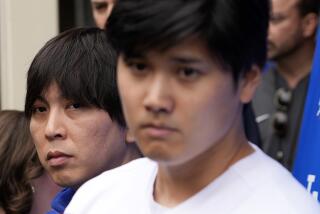U.S. Charges Japanese Trader With Bank Fraud : Wall Street: New York-based employee is accused of concealing $1.1 billion in unauthorized bond losses. Daiwa admits poor oversight.
- Share via
In a case reminiscent of the scandal that scuttled the British investment bank Barings, federal authorities on Tuesday charged a New York-based trader for Japan’s Daiwa Bank Ltd. with fraudulently concealing unauthorized trading losses of $1.1 billion.
If the allegations are proven, it could be the biggest bank fraud ever committed on U.S. soil.
Although Daiwa, unlike Barings, will survive, the debacle is a further embarrassment to the Japanese banking industry, which is struggling with $400 billion worth of bad loans accumulated in a binge of real estate and stock market speculation during the 1980s.
Daiwa, in an unusually candid news conference at its Osaka headquarters Tuesday, acknowledged an astonishing lack of oversight of a trader who allegedly covered up 11 years of losses stemming from about 30,000 trades of U.S. Treasury securities. Trading in Daiwa’s stock did not open early today in Tokyo as an avalanche of sell orders drove the offering price down nearly 5%.
The trader, Toshihide Iguchi, 44, an executive vice president of Daiwa’s New York branch, not only oversaw his own trades, but also the accounting operations that were supposed to monitor them, Daiwa said. He allegedly sold securities owned by the bank or held in custody for its customers to cover his trading losses, then forged documents to conceal the sales.
“We entrusted him with everything--we really trusted him and evaluated him too highly,” bank President Akira Fujita said of Iguchi, a Kobe native educated at Southwest Missouri State University who is now a permanent U.S. resident.
According to Daiwa, the damage grew hideously from an original $200,000 trading loss Iguchi incurred--and covered up--in 1984.
American market experts on Tuesday faulted Daiwa for its shocking laxity of supervision.
“No one could hide 30,000 trades for 11 years if there was any notion of separation of the front-office trading function from the back-office accounting,” said Heinz Binggeli, managing director of Emcor Risk Management Consulting in Irvington, N.Y.
Iguchi, arrested by FBI agents at his suburban New Jersey home Saturday, is being held without bail at the Metropolitan Correctional Center in lower Manhattan pending an Oct. 10 hearing. He could face up to 30 years in prison plus fines of $1 million if he is found guilty of what U.S. Atty. Mary Jo White called “a wide pattern of illegal conduct” relating to the alleged bank fraud.
The U.S. attorney’s office in Manhattan is investigating the losses and Iguchi is cooperating, sources familiar with the situation said. The investigation is expected to be broadened to include others at the bank.
Daiwa said it first learned of the massive trading losses in a lengthy confession letter--dated July 13 and written in Japanese--that Iguchi allegedly signed and sent to Fujita. The letter outlined years of unauthorized bond trades and detailed the methods used to conceal them.
*
The Daiwa case parallels Barings in terms of the degree of freedom given to the traders, both of whom essentially oversaw themselves.
Barings collapsed and was bought by ING Group of the Netherlands in March after Singapore-based trader Nicholas Leeson lost $1.4 billion with bad bets on the Japanese stock market.
Daiwa--the world’s 19th-largest bank, with assets of $182 billion and shareholders’ equity of more than $6 billion--is in no danger of collapse, officials said. Japan’s finance minister, Masayoshi Takemura, said Daiwa has sufficient resources to cope with the loss, so it will “not cause any concern over Daiwa Bank’s financial strength.”
Daiwa also plans to dock the pay of its chairman and president by 30% and cut the pay of nine other executives by 10% to 30% for six months starting in October to make up for some of its losses. The bank’s directors will also be forced to give up their bonuses, and executives responsible for Iguchi may be demoted.
“We are deeply embarrassed that our internal controls and procedures were not sufficient to prevent this fraudulent action,” Masahiro Tsuda, general manager of Daiwa’s New York branch, said in a statement, adding, “We are implementing a series of stringent new procedures to strengthen and improve the controls in our worldwide trading operations, which we believe will ensure that this will not happen again.”
In Japan, Daiwa has carved out a reputation as a strong regional bank with strengths in consumer banking and small business. As the only Japanese commercial bank that operates a trust business, Daiwa also ranks as the nation’s No. 1 pension fund manager.
Katsuyoshi Hamahashi, a Bank of Tokyo executive now working in Los Angeles, spoke admiringly of the bank’s domestic operations but said Daiwa is not as skilled in international banking.
Hamahashi expressed confidence that a similar situation could not happen at other major Japanese banks such as the Bank of Tokyo, where the headquarters staff maintains a tight control over market-risk management within the country and at the bank’s overseas branches.
Others were not as certain. Jack Huddleston, a former international banker for Chemical Bank and American Express, said the distance and language barrier make it difficult for any bank to monitor overseas employees as closely as domestic ones.
Huddleston said Japanese bankers have trouble keeping close watch over their U.S. operations since the books are maintained to meet U.S. laws and are kept in English. In that case, the bank’s Japanese executives are more likely to depend on longtime employees, such as Iguchi, who are fluent in English and familiar with U.S. banking laws.
*
Iguchi was one of the most active traders of U.S. debt in the late 1980s and early 1990s, according to traders at the major bond firms.
Along his way to the top on Wall Street, he acquired the nickname Tosh (pronounced “toast”) among his bond market colleagues. Iguchi would buy and sell 30-year Treasury bonds constantly, sometimes trading as much as $500 million worth a day, they said.
In recent years, bond traders said, Iguchi curtailed his trading and began keeping a lower profile.
At Southwest Missouri, a small teaching college in Springfield, Iguchi was remembered as a “rather unremarkable” young man by Howard Matthews, the college’s foreign student adviser at the time.
Bloomberg Business News contributed to this report.
More to Read
Inside the business of entertainment
The Wide Shot brings you news, analysis and insights on everything from streaming wars to production — and what it all means for the future.
You may occasionally receive promotional content from the Los Angeles Times.










